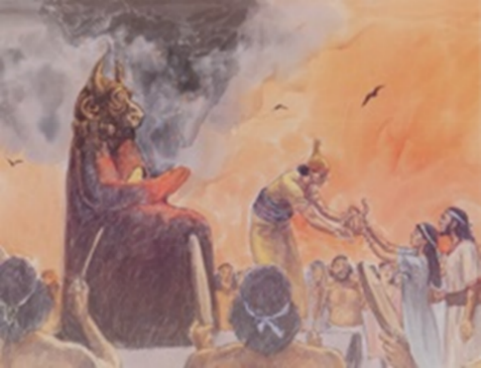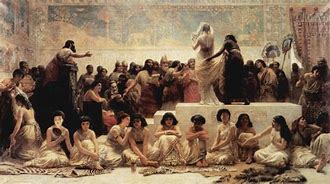Did you know God is a husband?
The Bible is nuptial: it begins with the wedding of Adam and Eve and ends with the wedding of Christ and the Church. As the divine Husband, God established the pattern for marriage.
God is a husband, the archetype of husbandly love and service. His very nature is loving, self-sacrificing headship. God is Ish, the Hebrew word translated “husband,” to His people Israel, just as Christ is the husband to His bride, the Church.
God chose a poor, enslaved people, the Hebrews, to be His bride. At the heart of the marriage was a covenant, the Decalogue, the terms of the contract between God and His  people. Israel entered into a covenantal marriage with God (Exodus 19-24). But as soon as they affirmed the covenant (Exodus 24:3) they committed adultery with a god of their own making, the golden calf (Exodus 32).
people. Israel entered into a covenantal marriage with God (Exodus 19-24). But as soon as they affirmed the covenant (Exodus 24:3) they committed adultery with a god of their own making, the golden calf (Exodus 32).
But we’re getting ahead of ourselves.
Exodus 34 records Moses climbing Mt. Sinai a second time and presenting new stone tablets upon which God would etch the renewed covenant. But first, God tells Moses His name, the longest name of God in the Bible, so that His bride would know who He is and the nature of His character.
The Lord descended in the cloud and stood with Him there, and proclaimed the name of the Lord. The Lord passed before Him and proclaimed, “The Lord, the Lord, a God merciful and gracious, slow to anger, and abounding in steadfast love and faithfulness, keeping steadfast love for thousands, forgiving iniquity and transgression and sin, but who will by no means clear the guilty, visiting the iniquity of the fathers on the children and the children’s children, to the third and the fourth generation. Exodus 34:5-7
God’s perfect character
God’s name reflects His character. He is
- Merciful (rachum – to have compassion, also translated “womb”)
- Gracious (compassionate, “merciful to the needy and repentant”)
- Slow to anger (patient, long suffering)
- Steadfast in love (chesed – unfailing love, loyal love)
- Faithful (truthful, trustworthy, integrity; God is true to His word)
- Forgiving (to remove incurred guilt and its penalty; forgive sin)
- Just (by no means clears the guilty – there is ultimate justice)
God’s name reflects His merciful posture toward His people. He is gracious and slow to anger, even when they prostitute themselves to a god of their own making. His love for them is steadfast. He is faithful to His promises in the covenant marriage, even when His bride is unfaithful. He is forgiving, but there will be justice. Those who broke the first covenant will wander in the desert forty years; their children will enter the Promised Land.
 The people had been warned not to worship idols (Exodus 34:14-16) but they did not heed the warning. They broke their marriage vows with Ish to prostitute themselves before the pagan god Baal of Peor, AKA Molech (Jeremiah 32:35) through child sacrifice and ritual sexual practices with temple prostitutes.
The people had been warned not to worship idols (Exodus 34:14-16) but they did not heed the warning. They broke their marriage vows with Ish to prostitute themselves before the pagan god Baal of Peor, AKA Molech (Jeremiah 32:35) through child sacrifice and ritual sexual practices with temple prostitutes.
While Israel was staying in Shittim, the men began to indulge in sexual immorality with Moabite women, who invited them to the sacrifices to their gods. The people ate and bowed down before these gods. So Israel joined in worshiping the Baal of Peor. Numbers 25:1-3
In doing so, their character changed: “But when they came to Baal Peor, they consecrated themselves to that shameful idol and became as vile as the thing they loved,” Hosea 9:10b.
God is a husband
While Israel took on the character of Baal, her rightful husband, Ish, still honors His part in the covenant. God is a husband: He continues to love Israel and provide both basic provisions and abundance out of His compassion and care (Hosea 2:8).
Israel becomes as vile as their idols, and God uses these consequences of rebellion to teach His people. He sends the righteous prophet Hosea to marry a prostitute (Hosea 1:2-3). If you wonder why God would tell a righteous man to marry a prostitute, the answer is found in Hosea 3:1-3. God raised up Hosea to provide a living parable so that, through this man the Israelites might get a glimpse of redemptive suffering.
And the Lord said to me, “Go again, love a woman who is loved by another man and is an adulteress, even as the Lord loves the children of Israel, though they turn to other gods and love cakes of raisins.” So I bought her for fifteen shekels of silver and a homer and a lethech of barley. And I said to her, “You must dwell as mine for many days. You shall not play the whore, or belong to another man; so will I also be to you.” Hosea 3:1-3
In loving his prostitute wife, Hosea is modeling to Israel the character of God. He bought her back, paid the price of redemption, for Gomer was OWNED by Baal – the “owner, master.” Hosea bought her out of bondage. This not only demonstrates God’s self-sacrificing love for Israel, it stands as a bright light pointing to the coming of Jesus Christ, the Bridegroom and His self-sacrificing love for His bride, the Church.
What is God’s bride worth to Him?
Part of a Hebrew wedding is the giving of the MOHAR, the bridal payment, from the groom’s father to the bride’s father. The mohar reflected the value of the bride (Genesis 34:12; Exodus 22:16; 1 Samuel 18:25). Hosea paid fifteen shekels of silver and a homer and a lethech of barley for Gomer.
What value did God put on us? What is your life worth to God? The Father paid the life of His son (John 3:16), the price corresponding to the value of the bride.
The Apostle Paul connects the dots between Hosea buying Gomer out of bondage and Christ buying us out of bondage. In Ephesians 1:7 Paul uses the everyday reality of a  Roman slave market to illustrate what Christ did for us. “In Him we have redemption (apolytrōsis) through His blood, the forgiveness of sins, according to the riches of His grace.” Apolytrōsis means deliverance, redemption, a ransom, a release. What was the means of deliverance for our salvation? What is the corresponding price of our redemption? The blood of Christ!
Roman slave market to illustrate what Christ did for us. “In Him we have redemption (apolytrōsis) through His blood, the forgiveness of sins, according to the riches of His grace.” Apolytrōsis means deliverance, redemption, a ransom, a release. What was the means of deliverance for our salvation? What is the corresponding price of our redemption? The blood of Christ!
How could this be, unfaithful as we are? Ah, “If we are faithless, He remains faithful— for He cannot deny himself,” 2  Timothy 2:13. God is faithful to His marriage vows even when we are unfaithful to ours. He paid the corresponding price to cover our failure.
Timothy 2:13. God is faithful to His marriage vows even when we are unfaithful to ours. He paid the corresponding price to cover our failure.
God pays the corresponding price to turn the story around. Hosea 2:16-17 is the heart of the book of Hosea. It is, perhaps, the turning point for the Scriptures’ nuptial narrative:
“In that day,” declares the LORD, “you will call me ‘my husband [Ish]’; you will no longer call me ‘my master [Baal].’ I will remove the names of the Baals from her lips; no longer will their names be invoked.”
God’s name reflects His husbandly character
Between the glorious Eve and the glorious bride of Christ, Israel fell to her lowest point, and here is the promise of restoration. God is a husband, not Baal but Ish. The pattern for a godly husband is Ish, the loving self-sacrificing head, not Baal, the tyrannical, brutal, owner. Hosea is to demonstrate Ish – husband, to Gomer (representing Israel), so that she may be restored to her rightful role as Ishsha – a bride, not property.
Now we come full circle to the name of God reflecting His character. When God instituted the marriage covenant, He gave the people His name (Exodus 34:5-7), so they could know the nature of His character. As we come to the end of the Old Testament (AKA Old Covenant) and before entering the New Covenant, God reveals His character again:
And I will betroth you to me forever. I will betroth you to me in righteousness and in justice, in steadfast love and in mercy. I will betroth you to me in faithfulness. And you shall know the Lord, Hosea 2:19-20.
Note this is a forever marriage, forever because of the character of the Bridegroom, the Ish:
- Righteous
- Just
- Steadfast in love
- Merciful
- Faithful
May you sense the overwhelming nature of God’s character. May we rest in His love and faithfulness.
- Darrow Miller






